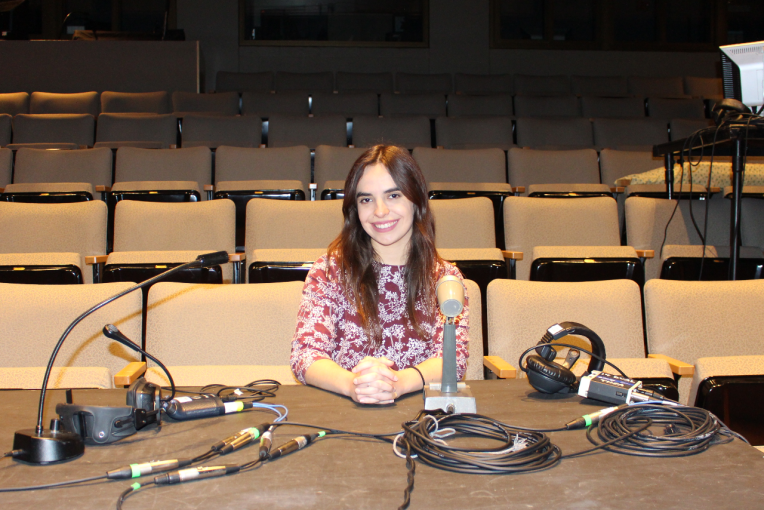The Graduate School has selected María Amenábar Farias as its September GradBird Scholar recipient! GradBird Scholar is an initiative to recognize graduate students for their scholarly endeavors at Illinois State University.
María is an international student from Guatemala City, Guatemala, who is a third-year Master of Fine Arts (M.F.A.) directing candidate at the School of Theatre and Dance. She is also the Graduate School’s first GradBird Scholar for the fall 2022 academic year. Hear about her first-hand experience within the MFA directing program and about her thesis project, Bonnie and Clyde: The Musical, which she is directing this fall.
What is your favorite part of the M.F.A. program here at Illinois State?
My favorite part about my program is the hands-on experience we get to work in our respective areas in the theatre. For example, as a director, I have the opportunity to direct a play or musical for the school every semester, which is a great way for us to learn and put what we are learning in class into practice. This is something that definitely makes our directing program stand out and is a part that I have enjoyed throughout my time here.
Do you work with a specific faculty/staff member to help with your research?
My advisor is Robert Quinlan who is the head of the M.F.A. directing program. He has been wonderful to work with, as he has supported my choices throughout the entire process and has offered very valuable advice whenever I encounter any difficulty.
Can you explain your research & its importance of it within your field?
My research focuses on how we can use the power of theatre to create social change in our communities, especially in the context of racial equality, cultural diversity, and women’s rights. I am especially interested in exploring how we can use identity-conscious casting and rehearsal practices to create social change. Identity-conscious casting and rehearsal practices are tools meant to empower the artists in the room, through which the identities of the artists are acknowledged as much as they are comfortable with, letting that inform the creation of characters and the world of the story, understanding that identity contains multitudes and goes beyond race, gender and sexuality.
Through the production of Bonnie & Clyde: The Musical that I am directing, I am interested in exploring the role of identity-conscious rehearsal practices when it comes to approaching historical figures like Bonnie, Clyde, and the rest of the Barrow gang. I am curious to see how the actors’ identities inform these historical figures and how we can use these to bring a modern-day perspective to the actions of Bonnie and Clyde and everyone in their lives. Understanding the effects of identity-conscious casting and rehearsal practices in a production can open up more doors for representation on stage and allow us as theatre practitioners to understand how to most effectively tell stories to our communities, given the identities of the people in the room working on the project.
Why do you enjoy researching this topic, and what more do you hope to learn about it?
I enjoy researching this topic because I truly believe in the power theatre has to influence how audiences think and perceive the world. As a Latina international student working in the theatre industry, I have learned a lot about the importance of using art and media to tell stories that address social issues and change our society for the better. Art is a very powerful tool, able to shape how people think and see the world, even if they don’t realize it at the moment. The media we consume affects our worldview, and this is why it is our responsibility as theatre artists to use our story-telling power for good.
Using theatre for social change allows us to use the power of entertainment to get audiences thinking and talking about how to create change in our society, addressing social issues that might sometimes be too scary or uncomfortable to bring up in casual conversation. This is why I enjoy researching how to best use theatre to create social change because I truly believe in its power to change our communities for the better.
What do you hope further research about this topic will do?
I hope that further research about this topic will encourage more theatre artists to engage in identity-conscious casting and rehearsal practices, proving that these practices have a place even when approaching characters that are solidly established in the canon in a specific way or when approaching historical figures. Consequently, I hope using these practices will allow for more representation to exist on stage.
Would you like to highlight anything else about your thesis project?
I would just like to invite everyone to come to see our production of Bonnie and Clyde: The Musical. Our production plays on November 3, 4, and 5 at 7:30 p.m. and on November 5 and 6 at 2 p.m. in the Center for the Performing Arts Theatre on campus.

